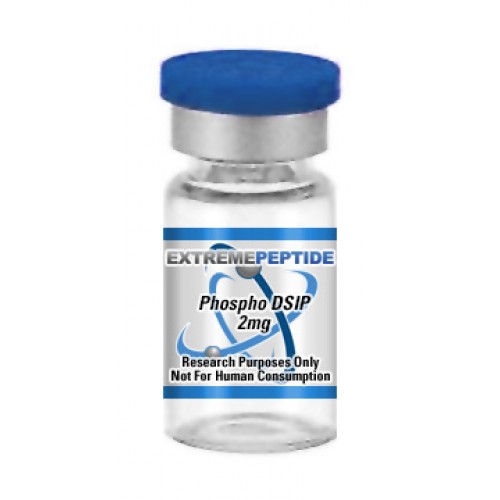Download or view the PDF version of this article by clicking here
Phospho DSIP is a peptide that is considered to be a neuropeptide. What this means is, it is a peptide that is used by neurons in order to communicate with each other. It is occasionally known by the alternative names DSIP or Delta Sleep Inducing Peptide. It has a molecular formula of C35H49N10O18P1, and it has a molecular weight of 928.8. When it is administered to animal test subjects for purposes of scientific study, its appearance is that of a white powder.
Phospho DSIP at a Glance
According to scientific study based on animal test subjects, Phospho DSIP is considered to be an amphiphilic peptide, meaning that it contains both hydrophilic (that is, water-loving) and lipophilic (that is, fat-loving) properties. It has been found within the body as a free form, and it has been found in bound form in the following structures:
- The hypothalamus – This is the segment of the brain that links the endocrine system to the nervous system through the pituitary gland.
- The pituitary gland – This is the pea-sized gland that is located at the bottom of the hypothalamus at the base of the brain and is responsible for the regulation and control of a host of endocrine system-related functions such as growth, metabolism, temperature regulation, and more.
- The limbic system – This represents the complex set of brain structures that collectively support a variety of emotional-based aspects, such as behavior, motivation, and long-term memory.
- Various peripheral organs, tissues, and body fluids located throughout the body.
In addition, Phospho DSIP has been shown to co-localise with various peptide and non-peptide mediators. The mediators themselves differ depending on where Phospho DSIP is located.
While it has been determined that Phospho DSIP can be found in several different places within an animal test subject’s body, scientific study has yet to precisely pinpoint where the peptide originates.
Functionality of Phospho DSIP
Scientific study that has been based on animal test subjects has determined that the presence of Phospho DSIP can help to boost the regulation and control of several different processes throughout the body. Because of the abundance of locations in which Phospho DSIP resides within an animal test subject’s body, scientific study has determined that the peptide itself is rather versatile. It has been thought to play a part in a host of different roles throughout the body.
For instance, the peptide has been determined to play a role in the process of endocrine regulation. It has been shown to decrease basal corticotropin level and inhibit its release. It also stimulates the release of luteinizing hormone, somatoliberin and somatorophin secretion as it inhibits somatostatin secretion.
Phospho DSIP also plays a part in various types of physiological processes. Some of these processes include limiting stress, normalizing blood pressure and myocardial contraction, and enhancing the efficiency of oxidative phospoylation. This latter attribute has led to the suggestion that it may possess various antioxidant effects.
Because Phospho DSIP is connected to the regulation and control of so many diverse bodily processes, scientific study that has been based on animal test subjects has been able to derive a host of different theoretical benefits that have been built around the peptide’s presence. These benefits that have been hypothesized touch upon both the mental and the physical, thus further demonstrating that the peptide does have a connection with various parts of the brain.
Phospho DSIP and Cancer
Scientific study that has been based on animal test subjects has determined that Phospho DSIP could conceivably contain certain properties that can be considered anticarcinogenic in nature. What this means is, it has been shown to be a substance that counteracts the effects of cancer causing agents or inhibits the development of cancer. This theory was developed in lieu of a study that was conducted on lab mice, in which a preparation of the peptide was injected subcutaneously over the mice’s lifetime. It was shown that the presence of spontaneous tumor incidence decreased significantly. This study in turn led to the theory that the presence of the peptide could be a key combatant in the treatment of cancer. It has also led to the notion that it could be used as a means to prevent cancerous tumors from developing in the first place.
Phospho DSIP and Anti-Aging
Scientific study on animal test subjects has also determined that the presence of Phospho DSIP could possess geroprotective, or anti-aging, effects. Studies have indicated that the presence of the peptide has the capacity to slow down the age-related switching-off of oestrous function in female animal test subjects, and it also was shown to decrease the frequency of various chromosome aberrations in bone marrow cells, some of which may ultimately serve to shorten a lifespan.
Click here to read Phospho DSIP – Part 2
